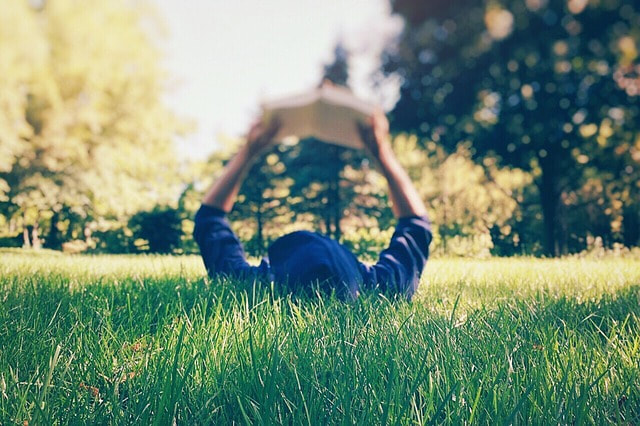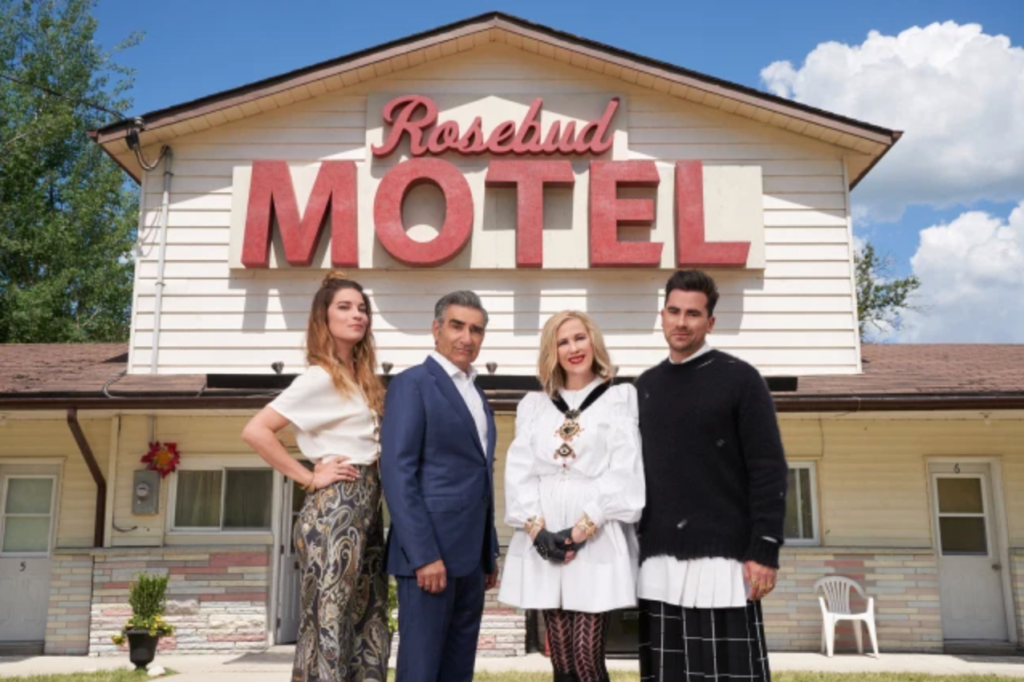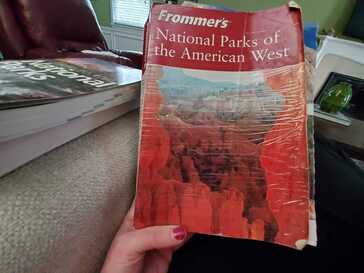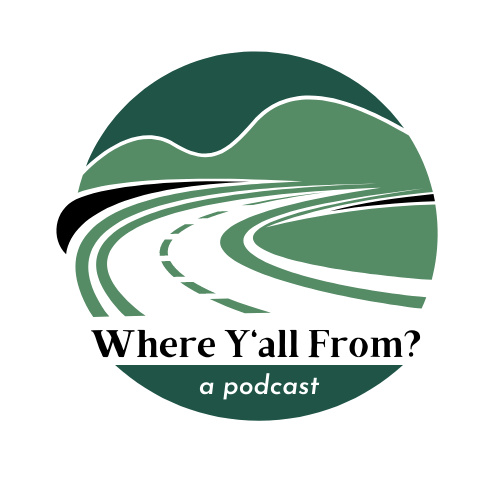|
Oh the joys of a summer trip to the library… my kids piling up more books than they can carry, me grabbing a few new release novels that will inevitably rack up late fees, and a few things I’ll never actually read (cause you’ve gotta have a backup)-- and then going home for an afternoon of family reading time and maybe getting ice cream drips on a few pages. Bliss.
This was one of the things I missed most during the pandemic. Our library was entirely closed for the longest time, and then they did “curbside pickup only” which was fine but all things considered, hard to plan for and utterly unsatisfying. I missed the roaming and browsing, and the flexibility to just go when we had a few minutes and were in the neighborhood. I missed finding and picking up things I’d never heard of. I missed watching my kids go to their favorite sections and totally nerd out over things I know nothing about. Add these tiny joys to the long list of things I will never take for granted again. Now the library is back! And it’s summer! Let the people rejoice. Also… what are we reading?? While I had a hard time focusing on ANYthing early in the pandemic, I got my reading mojo back about 6 months ago. I’ve also discovered the gift of audiobooks in recent times, so between the actual paper reading and the listening, I’ve covered some pretty good territory this year. The past year-plus has been a good reminder that a book can take you places, even when you can't go anywhere. As we (hopefully) start to go ACTUAL places again, here are some titles that I highly recommend for your summer roadtrip/hammock-lounging/beach-bumming/mountain climbing/porch-sitting adventures.
Every one of these books, in its own way, has the ‘sense of place’ factor--which is to say, the power to take you places-- that makes a book magical. So whether you need a book to take on the road this summer, or you need a book to actually be the road that takes you--we’ve got you covered. Happy trails!
1 Comment
“It is getting tricky for me to fix your hair... I feel like I am having to reach UP for the top of your head.”
It was the night before her first day of in-person school. After a year-plus of at-home virtual learning, 8 months into her 6th grade year, she was actually going to be in the building. This gradual, part-time ease into school at the very end of the year felt incredibly anti-climactic in some ways. But in others, it was huge. And so, I realized, was my daughter. For the last year or so, she has been allllllllmost as tall as me. Starting to borrow my shoes. She walked up to me the other day while I was standing in line at the grocery store, put her arm around me and said, “what’s up, Shorty?” And she was looking me square in the eye. And here we were, on the eve of her real live Middle School career-- asking me for a rare blow-dry because FIRST DAY OF SCHOOL (even if it is April); and I realized that the window of her being the same height as me had lasted all of 24 hours. I was literally reaching UP. “Wait, turn around,” I said. I shifted her around so we were standing back to back in the mirror, and there it was. It was obvious-- this child is taller than me. This will surprise no one who knows my family. I am 5’2”, so being “taller than mom” is not a huge achievement around here. And my husband is 6’7” in his socks, so we all knew this day of reckoning with his gene pool was coming for me. Still. She had a moment of delighted, if slightly baffled laughter, as I looked UP at this child I created from scratch. And then she said, all seriousness, "I could sit in a chair, if you need me to..." It may come to that soon, it really might. But for now, I can still reach her. And for now, I am just sitting here in awe at how much time marches on. Even in a lock-down year when time seemed to be standing still most days. The kids were growing-- and growing right past me--every second. * * * We have this little dog, a Jack Russell(ish) named Van Halen. He is mostly just “Van,” unless he’s in trouble, in which case it is his full name. We got him from a rescue when he was probably a year to two years old. This was a year before our daughter was born, so we calculate his age as “Harper-plus-2.” Which means he is probably about 14 now. Maybe 15, at the high end of counting. I don’t have to tell you that, in dog years, that is getting up there. He still gets around pretty well for an old man, though he is starting to do strange old dog things. He doesn’t hear very well so you have to get really close to call him now. He is getting much less tolerant of small children, strangers, and really, people in general who want to touch him or be in his space. And most recently--sometimes, in the evening, he will just cry for awhile. It is truly pitiful to see this dog who has always been so full of life and boundless energy just roaming or sitting in his favorite chair, whining for no apparent reason. I have figured out this behavior correlates with Tuesday nights, when dad has band practice at a friend’s house and is out late. When he’s gone to work during the day, Van is fine. But if it gets past dark and he’s not around, there is something unsettling about that for the dog. I wonder if it is, in some ways, a creeping doubt about his ability to be the Alpha and protect the family when his man-person isn’t home. Then again, perhaps I am reading too much into the existential struggles of a dog. Maybe his joints just hurt more at night. Maybe he needs more attention. Maybe he is just sad. Or maybe he knows that, even in the times when every day seems the same, when a year goes by and we’ve scarcely left the house, when nothing else has been certain or predictable or really seemed to “happen” at all… time just keeps coming. And at some point, we stop growing and just get older. * * * Wednesday was the weirdest weather day I have ever experienced. And I’ve lived in Kansas, where you can have a blizzard one day and a tornado the next. I’ve lived in Arizona, where the “fall” means you need a heavy jacket in the morning, and by afternoon it will be 105 in the shade. We woke up, this third week of April in Kentucky, to snow on the ground. By late morning, the sun came out, and the snow was melting in huge, clumsy clumps that sounded like someone throwing snowballs at my roof. By noon, it was sunny and all the snow was gone. And then, about 2pm, it started snowing again. Big heavy, wet snow that stuck to nothing, but came down for a solid several hours all the same. It went on like this all afternoon. By 6pm, we were at baseball practice and the sun was shining. It was bizarre. They say if you don’t like the weather in Kentucky, stay for 24 hours and it will change. In this case, it was more like 10 hours-- from Spring to Winter and back to Spring again. Like I say, bizarre. But also, a stunning reminder that this, too shall pass. That the sun always comes back eventually. And that a whole season can fly by in what seems like a moment. We are, all of us, in deep time. Sometimes we can feel it ticking by in minutes and days; at other times, we catch a glimpse of what it is to measure in lifetimes, generations, eons. The tree at the National Park that is a thousand years old. The artifact at the museum that is ten thousand years old. The outline of the Appalachian Mountains that defy calculation, but speak to time that has begun turning back on itself--grinding back to the dust what it once drew out of the bedrock. * * * By the time she went to bed, on the night before the “first” day of school, my daughter was finding less hilarity in her ability to look down at her mother. “I don’t want to be taller than you,” she said. “I like being AS tall as you… but I don’t want to be taller.” “Yeah, but here we are,” I said. “What can I say, you’ve got your daddy’s legs. We knew this day was coming for us.” It is some consolation to her, I suppose, that she can steal my shoes now. For now. As with all things that grow, evolve, or live out their season, it is somehow both the most unsettling and the most comforting truth imaginable: that time can crawl, or time can fly by-- but it is always, always moving. And bringing us along in its wake. 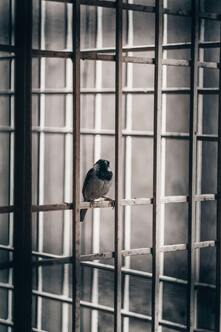 Tonight I pray for the most hated man in America. Not that he be comforted. Not that he find peace. But that he might know a thing we call Transformation. Because if there might ever be a moment of “Dear God, what have I done,” If there might be a shock of horror At glancing in the mirror, A slight shudder of “Whose blood is this on my hands?” Then maybe there can be this thing that we sometimes call Redemption. Atonement. Tonight I pray for the most hated man, But also For the ones who handed him a gun. For a nation that raised him to fear brown people, Grew him up to worship the idol of his own whiteness, And then handed him a gun again, saying “Here, go protect us From that one over there, With his hands pinned behind him. Go shield us from that man, Calling out for his mother.” Let there be a collective sigh tonight of Lord hear our prayer And what is it that we have done? And may we someday fully account for the number of souls, Beloveds, Whose blood runs in rivers down city streets In all this shining, sinful land. Tonight I will pray for the most hated man, For all the terror that the bars won’t keep out, For all the rage that the walls hold in. I pray Not for his comfort. Not for his peace. But that he might know a thing that we call Transformation-- even if we little know What it means. And I pray that he might, For the rest of his captive days, Speak with reverence the name of the one Whose breath he stopped On bended knee. “Um, it’s my turn to Take a Selfish.” “No, David. You selfished last time.” This is one of my favorite sibling moments on Schitt’s Creek, and it comes early in the show when we are still learning that David and Alexis do, for all their dysfunction, have a unique sibling bond. In this moment, you a) hear them speak in sib-code, which only people who have been close for many years can do, and b) get a little more of their backstory as they argue about who last took a selfish, and for what purpose. Part of the beauty of a well-written show is that they don’t have to stop here and explain (for the viewers’ benefit) what it means to “take a selfish.” Even if we don’t have that particular shorthand for it, hopefully we are lucky enough to have a few close relationships-- a sibling, a spouse, a lifelong friend--with whom we have such a history… meaning that we have the space to, occasionally, take a selfish. I don't know about y'all, but I feel like I’ve been taking a selfish for a solid year. As the world (or at least our privileged, nearly-vaccinated corner of it) eases back into some semblance of a new normal, I’ve heard a lot of people refer to a “lost year.” A year with no school, no family gatherings, no travel...maybe little work, or few interactions with those outside the home. I respect the sentiment, but I don’t really think of the year as ‘lost.’ Time went on, the seasons changed, and life continued to happen, even if it wasn’t what we were used to. But I am starting to think of it as a selfish year. At least, for me. For many people, this season has been anything but a selfish one. For healthcare workers, it has been the most demanding time imaginable. For those who are caregivers for elderly or ill family members, it has taken everything they’ve had to give. Educators and other school staff, who have scrambled to keep reaching kids amid unthinkable challenges and constantly changing protocols-- these are the least selfish folks I know. But me? I feel like I’ve spent a year nesting in, focused entirely on myself and my own family. Granted, in a global pandemic, that’s what we’re supposed to do-- survive and care for the people in our bubble. If we are not frontline workers or caregivers, our best contribution throughout this ordeal has been to stay home; to keep our family’s germs out of the mix so that others could do what they needed to do without added risk of exposure, and without us taking up space in a crowded hospital. But other than keeping my own family safe, and contributing financially to some folks I thought were doing good work… well, it has been a selfish year. Even knowing that this was not entirely a bad thing (and not entirely avoidable), it seems like now it is going to be difficult-- or at least, take some intention--to break out of this mindset. I’ve always tried to live as an outwardly focused person. But a year of being physically grounded has turned me inward, and I suspect I’m not the only one. How do we go back to living out there in a bigger world? Making room for other people? Reaching out instead of huddling in? My hunch is, it will not be a switch that we can flip by sheer will. “I CALL AN UNSELFISH!” Nope. Didn’t work. I don’t know, fam. I don’t know how we break out of the fortresses we have built from necessity. All I can say is, if you have spent this season of quarantine out there serving others, thank you. And if you have spent it at home, doing your part to dampen the curve, then thank you for that, too. My hope is that whatever comes next will be informed by the spirit in which we have done both things-- that the communities we build (or rebuild) now will have the foundation of all our best, unselfish intentions. One of the things that has brought me joy in this season has been watching Schitt’s Creek (okay, twice) and finally getting what all of the fuss is about. Initially, I couldn’t get into it. Like many others, I said “These characters are terrible people! I don’t care what happens to them!” If you are still in that place, reader, let me tell you-- it gets better. They are, at the outset, shallow and utterly selfish, yet. They are a family that has built an inwardly focused world because wealth and privilege has allowed them to do so. In those early episodes, they don’t know how to connect with each other, let alone this strange little town where they find themselves sequestered. But--pardon the small spoiler, this is important--it story of the Rose family is ultimately a story of transformation. The journey of people who experience a crisis of loss as a moment to shift their focus and broaden their world; to realize that they are, in fact, part of a wider community, whether they initially like it or not; that they have responsibility to take part in the world around them and, a foreign concept to them, their neighbors actually care about them too. Part of why the first season is so hard to watch is because they are resisting this reality in which they belong to other people. It is a selfish year. But in the end, they have all grown into people you can relate to; brilliantly flawed characters who have learned how to meaningfully participate in the world around them. Perhaps it can happen that way. 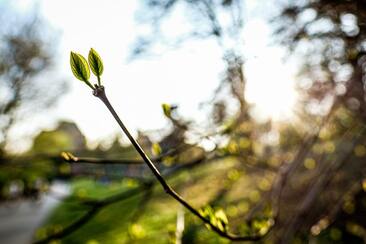 I've spent most of the week in the Blue Ridge mountains, on a much needed Spring Break trip with my fam and our friends/framily. (I hate that word, because it is so precious. But also, it is the right word sometimes. Especially during these quarantine days, when ‘framily’ are the only people we have had around for more than a year). After a few days of driving and hiking these mountains--on a day when we have some particularly squirrelly kids in the backseat, and a confused/homesick dog, and the men-folk are out doing mountain men mountain biking things-- I say to my friend, “is it just me, or do all these trees look...dead?” I mean, everything else is blooming. There are flowers everywhere, and the evergreen brand of trees are looking all bright and aggressively spring-like, and the grass is neon green and just begging to be a deer snack, and life in general is coming up roses. But half of the trees in the forest around us seem… well, they have seen better days. “A little sus,” as the kids would say. Completely dry, barren and brown. Kindling. It’s not looking good. But maybe I have no idea what I’m talking about? “No,” my friend says, “I thought so too.” It really does look like half the Pisgah National forest has just decided to call it. Pandemic year + climate change + downfall of civilization. Who would blame a tree for just giving up the ghost? I was concerned. For the hawks swooping hopefully overhead. For that deer in the road that stopped and, I swear, looked us dead in the eye for a second before sighing and sauntering off into her dying habitat. For the bears that supposedly lurked in the shadows, waiting to eat our trash--but who had remained on the DL for the duration of spring break and so, must surely lurk on the brink of extinction as well. It is possible we’re all in a fatalistic mood these days. Can you blame us? Because, let’s be real. Look around. The earth is a dying life form. We are just accessories. But on the third day… Early in the morning, on the third day, while it was still dark--it started to rain. I don’t mean a cute little spring shower. I’m talking cats and dogs here. A gully-washer, a deluge, a downpour. For about 12 hours straight. The earth got a generous soaking while we slept. And by mid-morning, when I ventured out onto the porch with my coffee (and if there is anything better than vacation coffee on the porch, in the mountains, in the rain, then I don’t know what), the first thing I noticed was--green. Everywhere. All those dead-looking trees had bloomed overnight. In the cold, in the dark, in the holler, a tiny bud just waited to be called out by the rain. In its time, it came. Maybe Ma Nature didn’t get the memo that Easter was not for a few more days yet. But she beats the pants off the liturgical calendar, every single time. For my money, in this year that has felt like one long winter/Lent/Holy Week of holding our collective breath, the breathtaking suddenness of that green was about all the church I needed. As Roethke said: "deep in their roots, all flowers keep the light." Everything in its season. All things bloom in good time. Or, if you prefer the gospel of Springsteen: "everything dies, baby, that's a fact/but maybe everything that dies someday comes back." May it be so. Amen. 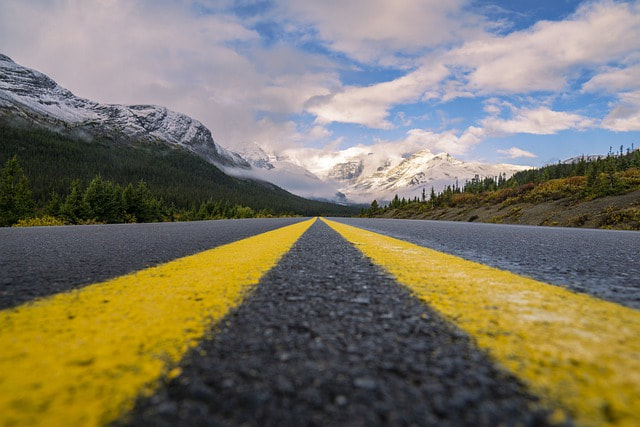 How much time is too much time to spend reading Air BnB reviews? Asking for a friend... Since we all know the friend is me, I’ll just tell you that I'm in vacation planning mode, and no help for it. Once I get here, you may not see me for awhile. I can spend hours, days, weeks, just perusing locations and destinations. And I’m perfectly happy about that. In fact-- few things make me happier. It has always been thus. But after a year of quarantine, my vacay planning vibes are just extra at the moment. I've decided to lean into rather than away because really, it's kind of a freight train situation and I couldn't stop it if I wanted to. Before you holler at me that THE PANDEMIC IS NOT OVER-- I know this. I do. I am looking at reasonably remote locations. We will wear masks. We avoid crowds. We will eat outdoors or cook for ourselves whenever possible. But still. The very idea of being able to plan a trip is a joyful thing after this never ending lockdown winter. And when I heard that every adult in Kentucky would be vaccine-eligible by April--and since I have a 4th grader, and every 4th grader in America gets a free National Parks pass for their family through the National Parks Foundation [to which I am a regular donor, so I guess I'm technically paying for it, but still]-- it kind of feels like the whole universe is saying: go. So I dusted off an old favorite book that is literally falling apart from overuse, if not recent use: Frommer's Guide To National Parks of the American West. In our younger (read: pre-kid) days, my husband and I wore this thing slick out. When we moved from Kentucky to Arizona, we took 6 weeks off between jobs and did an epic tour of the west. He still had his Marriott employee discount at that point, so we would camp for 3 or 4 nights, then find a hotel so we could shower and do laundry or whatever. Then we’d drive awhile and to it again. It was one of the best times in my life. We’d been married for two years at that point, but I think that is the trip when we learned to Be Married. We learned to be really on our own, away from all our other people; we learned what a 5,000 mile road trip will do to your car (even a Toyota); we learned how to fight, and how to just let shit go; we learned to navigate. And when I say navigate, yes, I mean both literally and figuratively. But I also mean, without smartphones or GPS devices. Can you even remember those days? Sometimes, it is beyond my reckoning how we used to get around town, much less across the country. But as I flipped through my ancient Frommer’s guide, and I see all the notes and underlines and circles that 20-years-ago-me thought were interesting or important-- I remember that we really did just have that book and an atlas. And we just went. We had cell phones, but they didn’t do much. They didn’t even have signal half the time, especially in the wilds of Zion or Yellowstone. No navigation. No TripAdvisor app, telling us where to find the best burger in Montana. No AirBnB finding us a place to stay when we couldn’t find our preferred (heavily discounted) chain. No roadside assistance on speed dial when we had a busted tire in East Jesus, Utah; or a completely melted car battery in Idaho. These were things we had to just… figure out. And I guess we did. Once we settled in Arizona, we still made good use of that gospel. Day trips, weekend trips, week-long vacations-- when you live in that part of the world, all these amazing places are right in your backyard. And so we went. Flipping through this book is a trip, in more ways than one. It has phone numbers-- actual phone numbers, you guys-- to call visitor centers in various park-adjacent towns. To ask the nice, helpful folks where you should stay, plan your hikes, see if they can help you book a campground… can you imagine calling an actual person for that?? Like you can’t just sit down at your laptop with your Saturday morning coffee and read the traveler reviews of thousands who’ve gone before you? It reminds me of this whole other world we used to inhabit. It’s not a bad place to visit, by any stretch. I have never felt so free in my life as I did during those nomad weeks, deciding each day where we would pitch our tent-- literally. But it does draw into sharp relief how much things have changed. Not just in the past two decades, but the past year. We all know that much about the travel industry has changed, at least for the short term. Fewer people on planes, masks everywhere, more outdoor dining, lowered capacity at museums and other tourist spots… but I am noticing some things about what I’m looking now for as well. For instance, I’ve always avoided crowds, tourist traps, and “high season” as much as possible. But my reluctance to book in really popular locales is kind of next-level at the moment. You could not pay me enough to go to a theme park this year-- possibly ever again. And miss me with any rental or reservation that does not have a very generous cancellation policy. If we’ve learned anything, it’s that things can fall apart quickly. Flexible travel is the only travel left, as far as I’m concerned. My hunch is that, as the ice breaks and more of us begin to venture out, much will change about the way we travel; and some of that change will be permanent. Our ways of thinking and interacting with the world have undergone a radical transformation over the past year-- and we are only beginning to glimpse what this new world will be. We are writing the book of these days as we speak. In 20 years, we will read it again and marvel at how we used to do things. Or rather- how quickly we found a new way of doing things. One thing that I know has not changed: travel is healing, and restorative in a way that few other things can be. The family time, the off-grid time, the ‘see where the wind blows us today’ feeling that can only be accomplished when you leave your work and your stuff and your walls behind… for many of us, this is soul movement. How we get there may look different--whether for the short term, or forever-- but as for me and my house, we will go. And, as with much of life-- we’ll figure it out when we get there.  I got braces this week. And not the magic “invisible” kind. Full on wires, metal brackets, the whole deal. It’s kind of a long story, involving years of jaw problems that, ironically, multiple professionals have told me were CAUSED by the orthodontia I had when I was younger. It was pretty extensive, involving a couple years in a palate expander, some other tedious procedures, and nearly 5 years in braces. (When they finally came off my senior year of high school, all I wanted to do was kiss boys, free of hardware). Apparently, in the old days, all they cared about was the aesthetics of getting our teeth straight and pretty. They weren’t looking at our whole bodies, considering things like growth and alignment. And so, for a lot of us, all that manipulating caused longer term, whole body issues. The irony is not lost on me that I am wearing braces to fix issues caused by braces. If I overthink that it keeps me up nights. I feel like a teenager again, and not in a good way. Much of the experience is exactly as I remember -- the cuts and scrapes on the inside of your mouth, the difficulty of learning to eat and talk around the metal, and the feeling of some foreign body being always a part of your body… But here’s what’s interesting-- I also remember my mouth being really, really sore the first few days after getting a new wire on. But this time, there is no pain. Well, aside from the minor lacerations on the inside of my lip, but you know. My actual teeth aren’t sore. Could it be that my teeth remember where they are supposed to go from all those past years of wrangling, and so they just snapped back to attention immediately with no fuss or drama? Our bodies are amazing. They remember. I used to be a dancer, and to this day, I can easily fall into certain kinds of movement without even thinking about it. A certain song will make me remember an entire combination, something I must have practiced hundreds of times before a performance or competition. While the execution might be lacking, the muscles remember. I mean, I can no longer manage a toe touch in the air and land in the splits; and for the safety of all around me, will not attempt such things at 40-plus. But my muscles remember how to get there, and what to do next, and how to move into the next thing after that. I dance in my sleep sometimes. During the pandemic I’ve gotten on the virtual fitness train. I’ve been doing a lot of HiiT and weight training, but was getting bored with that. I thought I’d try the whole Barre thing that is all the rage, and I was so happy when I realized it was not just a ballet-based workout but actual ballet. I was ready to dig out ballet shoes and go get my old barre from my mom’s basement. It was not lost on me that this ‘workout’ is comprised of exercises that, at one time, were just a warm-up for hours of actual dancing--but still! I was all in. A few days into this new routine, my hips started hurting. I thought it might be my desk chair, or my shoes, or some other external factor. But by process of elimination I figured out that the real culprit was the ballet life I was trying to reclaim. My hips just did not want to do that anymore. For the uninitiated, ballet--even just the warmup barre exercise--requires a certain rotation from the hips, a “turnout” that you hold through every movement. If you have not been training your body to turn out for years, it does not come easily. In fact-- I never had great turnout, because I didn’t start ballet until I was about 13. At which point, you are basically grown. There are many things you can learn and condition your body to do. But turnout is just not one of them. Which I just recently remembered. Or rather, my muscles remembered for me. My body told me that I am a grown-ass woman and somebody’s mother and maybe now is not the time to dust off my dreams of being a professional ballerina. And I’d better not dare even THINK about trying on some toe shoes. However, there are plenty of miraculous things my body is capable of, dance related and otherwise, that need not cause pain and suffering. On a side note, I’m concerned that the fitness industry is pushing these ballet-based fitness regimes for grown adults whose joints and muscles are not trained to turn that way. I’m wondering how many other middle aged women are waking up with aches and pains that they think they just need to power through, like any other sore muscle, not realizing that there is something really unnatural about some of those movements, and that your body will actively protest if you haven’t been working towards this since you were 5. On a more existential note, I’m just over here marveling at what our bodies remember, for better or worse. And what they can tell us, if we listen. Speaking of listening-- we have a new podcast episode! Check out our interview with Kory Caudill, one of the top pianists in the world. (And we aren't just saying that because he's our people).  It's 5pm. You've spent the past 8 to 10 hours of your life on a computer. Possibly multiple computers. You've oscillated between screens and tabs; you've written documents, powered through hours-long Zoom calls, helped your kids with "new math" and any number of technical difficulties with remote learning, answered a few texts, read and written more emails than you care to count; and/or stared at a spreadsheet until the little lines start to dance and possibly talk to you. Is it really only 5:00?? If it is, and if you are calling it a day, then good job. Many of us working from home these days-- or even working at a real live actual office-- have trouble punching out and logging off at a designated hour. With these strange days of multi-tasking work, school and household management--often from the same space--the lines between 'work' and 'not work' hours blur easily. You may step away at a certain time but... well, if your office is in your house, you are really still there, aren't you? Regardless of your live/work situation, the bottom line is that most of us are spending many, many hours looking at screens on any given day. And often long past 5pm. We are looking at screens to pay the bills and order groceries online. Screens dominate our entertainment and social lives too- interactive video games, virtual happy hour with friends, and of course, the binge watching. Netflix, Prime, Hulu, Peacock...wherever you choose your escapist plot lines. Which is to say: many of us are in full-on sensory overload mode a whole lot of the time. And in such a state, the gift of being able to sit and LISTEN to something without having to LOOK at something is wonderfully life-giving and possibly even healing. Whether it is music, news radio, or an audiobook, the sound nurtures another part of the brain. We learn something, we spark our creative energy (who knew that was still there??), we might even find ourselves feeling rested and renewed. Maybe this is why podcasts have taken off as a new favorite medium--we are tired of looking at stuff. We just want to listen. All that said, dear reader, thanks for hanging in and reading this far, getting through all these WORDS on a screen to get around to what I'm really here to tell you: today, we are launching a new podcast! And by "we," I mean me and my little brother. Chris and I have always talked about how much we'd love to work in radio, or how great it would be to have a show. One day recently, the pieces just started coming together, and even though it all happened quickly, this first episode feels like a thing we've been planning for a long time. So with that, let me introduce you to the pilot episode: Most folks have a small town somewhere in their past. And for many of us: it’s complicated. “Where Y’all From” explores the often fraught relationship between where we’re from and who we are. In this pilot episode, brother-sister cohosts Chris Smallwood and Erin Wathen introduce their hometown of London, Kentucky, sharing thoughts on "global chicken" (also known as KFC), local flavor, and the funky Americana that makes all of our small towns feel like home. In future episodes, we will interview guests -- mostly, folks who are from small towns but no longer live there anymore. We will ask them about what foods and funky facts make their hometown unique; we will talk about how they place they come from impacts who they are and what they do; and we will talk about the complicated tensions of being homesick for a place where you don't really want to live...or maybe you do, but you can't. Our hope is that time spent listening to us, and our guests, will feel like a retreat from routine and other demands. We want you to feel like you've been someplace. We hope to leave you feeling inspired. After hearing other folks talk about the places they're from, you might even come away feeling a little bit more connected to your own community, your own story, your own sense of place in the world. So with that very long introduction, may we present, Episode 1: Global Chicken. 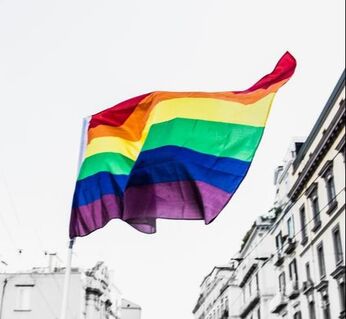 The world is not black and white. The world is not black and white. On this day in 1973, the American Psychiatric Association declared that homosexuality was not a disease. As with so many moments of progress, that seems both a really long time ago, and not that long at all. Today I’m leaning more on the side of ‘not that long at all,’ because here we still are, watching politicians hash it out over the full humanity of our friends, neighbors, brothers and sisters who do not identify as purely cisgender, heterosexual and binary. It’s confounding that some of our elected officials are digging in their heels to block LGBTQ rights when we are in the middle of a global pandemic and over half a million Americans have died; we are staving off an economic disaster; and the environment is sending red alerts, by way of deadly winter storms in Texas, that we must change our ways… This squabble over equality is what they want to hang their hats on? But here we are. The Equality Act, passed by the House this week, will now go to the Senate for a vote. The party line for those who oppose it is predictable: they are worried about religious freedom. The road from ‘gay rights’ to ‘religious freedom’ is a pretty twisted but also familiar path. Their bottom line is that businesses should not have to cater to a “lifestyle” to which they are opposed. So, just for instance, a conservative florist should not have to decorate a gay wedding. Or, to go one further-- a religious school should be able to fire a teacher if they find out he has a same sex partner, etc. But we can call b.s. on that action because what they are really, blatantly trying to do is protect the rights of an institution to discriminate. It has nothing to do with religion, nor does it have a thing to do with freedom. The First Amendment was intended to protect religion from government-- not to impose religion ON governance. This is a fine distinction that sends many of our ideological disputes into a spiral, ending with meaningful policy just circling the drain. But protecting the rights of LGBTQ folks in no way impedes your right to worship or practice your faith in private life. You can go to any church you choose, and do or say whatever you please there. In your own home, pray however you want. Even in public spaces-- go for it. Nobody can stop you from taking a bullhorn and loudly proclaiming your brand of gospel from the street corner next to the adult entertainment complex or the abortion clinic. Rage on, I guess. This is America. But if you operate a business, then you are operating in another realm of public life. You are functioning as part of the community--and there are certain covenants that bind you as a neighbor, as part of a wider economy, beyond the confines of your religious life. Embody those Christian values however you want in terms of your behavior, or what words and symbols you might display in your workspace. But how you function as an enterprise no longer falls under the purview of ‘religious freedom.’ Don’t want to hire a gay person or decorate a gay wedding? Perhaps it’s time to find a new line of work. The year is 2021. What has become clear to me as we hash these same arguments out, again and again, is this: spirituality itself is a lot like sexuality. There is a spectrum. And it is becoming increasingly acceptable to come out as nonbinary in terms of religious belief and practice. You don’t necessarily “believe or not believe.” You don’t have to be all in or all out. You are never just a saint or a sinner. You can hold doubt and devotion in the same spaces. The truly faithful do it all the time. The evolution towards nonbinary thinking is a big part of maturity in general, and faith development specifically. I’m reading Richard Rohr’s The Naked Now, and this is his entire premise--we are only surface living as long as we see the world in binary terms. Years of study in the field of faith development reveal the same truth. The ability to weigh critical thinking alongside our religious beliefs is essential. Otherwise, we are not really practicing faith, we are just being superstitious. Clearly, many of our leaders are still stuck in the infant stages of both critical thought and faith development. But my bigger concern is that so are our institutions. Both religious and the secular, church and state, remain stuck in this early-stage perspective that all things must be either/or. Like a toddler just developing spatial awareness and object permanence- did that toy just go behind your back, or did it disappear?? Here lies the very heart of so much discord. I hold out hope that the Senate will pass a vote for movement and change- a shift towards growth mindset and nonbinary thinking in general, and more to the point, an affirmation of the full freedom and dignity of LGBTQ folks. Even if the vote doesn’t go that way, we can keep moving in that general direction. We continue to evolve in both faith and critical perspective, moving towards not just a more equitable world, but a healthier, more productive way of living in it. I want our LGBTQ fam whose lives will be affected by this vote either way to know that, even if this measure doesn’t pass, we have your backs. That we are even still fighting about this is absurd, and I am sorry for it, truly. If we continue to be held hostage by regressive politics (and religion), please know that we will keep trying to find a better way. In the meantime, whatever comes, take comfort in this truth: the world is not a binary place. Very few things are entirely left or right, right or wrong, light or dark. Clearly, this is true of our institutions, both the faith-based and the secular. And the longer our systems of religion and government try to function in absolutes that don’t exist, the weaker they become. I’m never sure if that’s the good news or the bad news, but I do know this: embracing the beauty of the spectrum is the more life-giving way. Any existing structures that fail to see this will eventually crumble under the weight of their own rigidity. And when they do-- maybe what’s left is a better foundation. Colorful, resilient, free. Call your Senators and invite them to join us in this century. 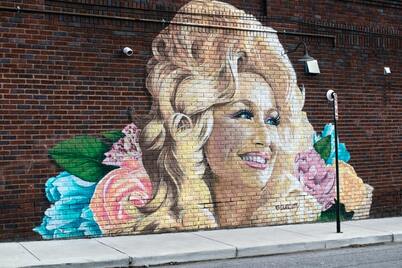 We already adored her. Of course we did. As a musician, she is legendary. An institution. I've been in that room in the house in Dollywood where they have all her awards, and it is too much for the eye to take in. And you just KNOW she's got a few favorites at home on the mantle too. Her body of work speaks for itself, accolades aside. There is a Dolly song for everything, and we know every word. But the music is not the only reason she is so beloved. There is an incomparable something about her that has always sparkled, always made you feel like you KNEW her, like you could run into her at the grocery store and she'd give you a hug. (Let me stop you now if you feel compelled to disavow me of this particular daydream). But at this particular moment in history, heavy and chaotic as it is, Dolly has emerged as something much more than iconic artistsand genuinely nice person. She is a unifying figure, one who has managed to bring hope, joy, and a kind of aspirational resilience to the present upheaval. Jad Abumrad explored this phenomenon in his podcast, Dolly Parton's America, even before the pandemic. If you have not already listened to every single delightful episode of this series, then congratulations: your weekend is planned! A philanthropist to the Nth degree, she has long provided scholarships for any kid from her hometown who wants to go to college. Fiercely committed to literacy, she has donated over 130 million books to children around the world. And just recently, she made a many-zeroes contribution to Vanderbilt Medical Center, funding research that made significant strides towards a coronavirus vaccine. It’s no wonder Tennessee wants to put a statue of her on the state’s very front lawn. And here, I think we might be coming around the heart of things, the intangible something that makes Dolly the incomparable force that she is, and it is this: she doesn’t want the statue. In response to the announcement she said “I am honored and humbled by their intention but I have asked the leaders of the state legislature to remove the bill from any and all consideration. Given all that is going on in the world, I don't think putting me on a pedestal is appropriate at this time” What it takes to step out of the spotlight in a moment like this is something more than just humility. It is a whole different kind of internal economy: one that defies individualism. This is what it looks like when you know that you don’t live for just yourself, and that nothing you have is really your own. Because when you get right down to it… you are just part of the neighborhood. More than anything else Dolly just gets that. As a rule, America operates on an economy of self-- glorifying independence and rendering individualism a uniquely American idol. Such an economy is rooted in ego; it values wealth, seeks status and power over communal wellbeing, and elevates “personal freedom” above all else. This is how one of the wealthiest and most privileged countries in the world ends up with one of the highest death rates in a global pandemic: because our toxic notions of 'personal freedom' somehow got caught up in a fight about masks and, well, here we are. These twisted notions of individualism also lead to things like: corporations get to do whatever they want, even if it means poisoning the environment. A de-regulated power grid in Texas that fails in catastrophic fashion and costs lives in a moment of crisis. Generations of systemic racism that we can't seem to even talk about without white folks hollering how "It's not my fault, I never owned slaves!" and "all lives matter!" in yet another communal failure of empathy. And the guns... let's get into the 'personal freedom' gun conundrum another day, because we're talking about Dolly here and I want to stay on task. Ultimately, what Dolly displays with her life is this wonderfully counter-cultural understanding of her place in the world. And it's hard to be counter-cultural when you are so deeply a part of the culture, you know? But that's what makes her kind of extraordinary. She has this internal economy, not of independence, but of INTERdependence. And I think deep down, we all know that is the way. Now more than ever. For my part, one of the things that I've always loved most about her is her accent-- here is one of the only truly famous people in the world who comes from that part of the world and yet did not somehow water down or eliminate her dialect to make herself more relatable to folks on the outside. Though I'm sure she's been pressured at times to talk more "regular," I hear home when she talks, and I love that she represents my people and my place out there in the wide world. That sense of place is what people see in her that sparkles, that connects, that we want to somehow emulate but don't know how. Here is a woman who has more fame, fortune, and power than any of us would know what to do with; and yet she continues to honor her roots, and to take her place as part of a larger whole. Giving back to make communities stronger, to give families a future--maybe even to help end a global pandemic. But she'll pass on the statue, thanks. She is just part of the neighborhood. If we want to be like Dolly, but no one is offering to build us a monument that we can turn down (just speaking for myself here) then where to begin? All I can say is, it has to do with transforming our internal economy from one of independence to one of interdependence. To start: know where you're from. Then, just take your place in the neighborhood. Be who you are. Show up for folks. Sing a song. Read a kid a book. Give something away. Maybe see what comes to life from there. We will always love you, Dolly! These are just a few of the reasons why. |
Archives
March 2023
Categories
All
|
